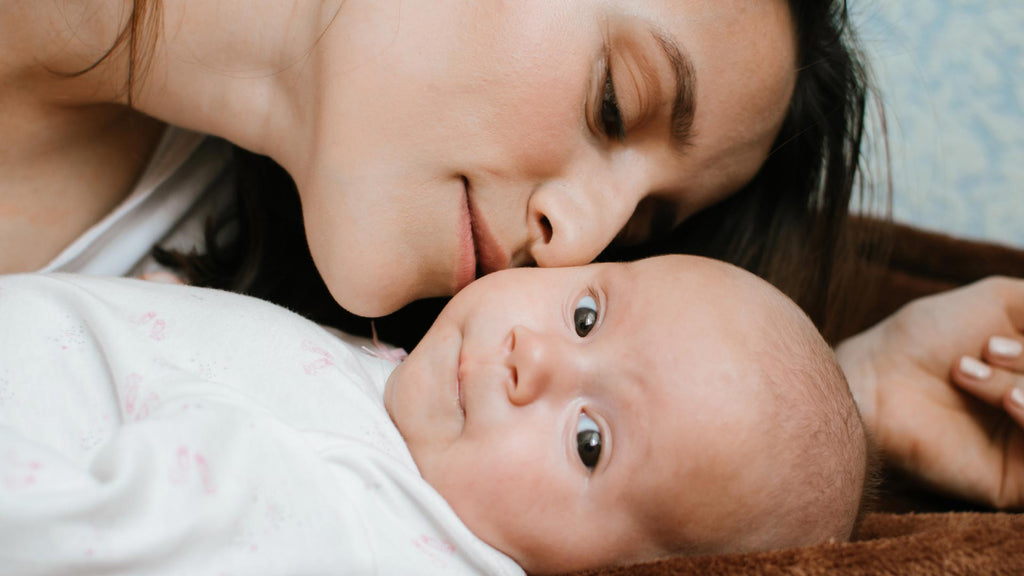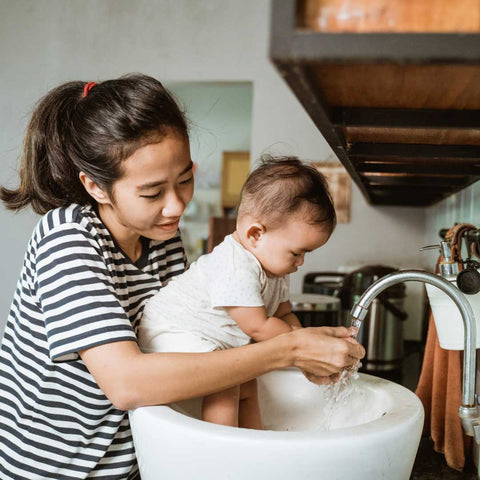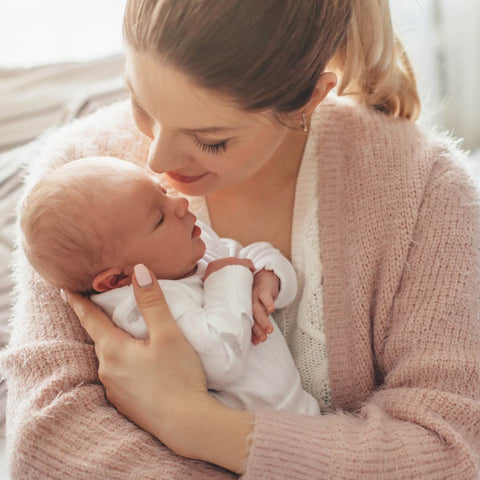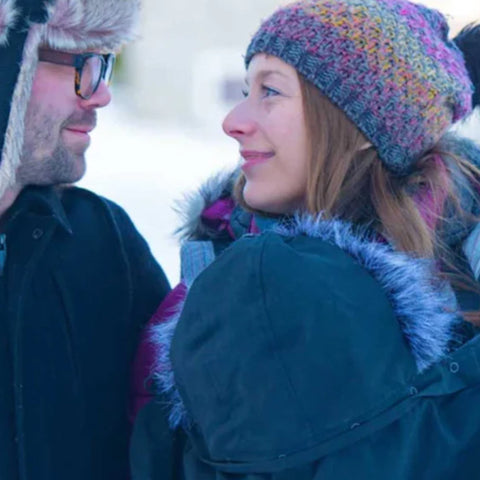
Winter is often a source of worry for the parents of young babies who are afraid they could get sick while still very fragile. There’s no doubt that the abrupt transition from a protective environment, inside a mother’s womb, to an environment where microbes abound at the moment of birth, constitutes one of the first challenges of every baby’s immune system.
In this article, we’ll tackle the measures to take to protect your baby from illness and seasonal viruses and propose ways to reinforce his still-developing natural defenses.
1. First and foremost, a good hygiene:
To protect your baby from illness, rigorous hygiene is primordial. Babies are fragile and less resistant to threats from the outside world the way an adult could fight it off.
Here are a few essential points to consider:

- Frenquently wash your hands: Use a mild soap and lukewarm water and do it mandatorily each time you handle your baby or prepare his meals. In addition to washing your hands, wash.
- Do not smoke near the baby: Second-hand smoke can worsen respiratory infections and compromise your child’s health. Furthermore, it is recommended not to smoke inside to preserve the home’s air quality and reduce the risk of contracting illnesses.
- Take measures against dust mites and pet hair: If your baby is already subject to respiratory allergies, dust mites could promote infections. To limit their presence, avoid as contact with pets much as possible and regularly clean up your house. Vacuum carpets, rugs, and upholstered surfaces, and regularly wash your baby’s bedding at high temperature
2. Temperature and humidity regulation in your home:

For your baby to feel comfortable in your home, and above all, for him to develop his immune defenses, some advice should be followed:
- Do not over-heat your home: This advice is valid for all rooms in your home, but is especially important for your baby’s room. According to the Institut national de santé publique du Québec, keeping your home at a temperature between 17 and 18°C will allow your baby to have an optimal thermal regulation. Before the age of two, children have more difficulty regulating their temperature and this setup will be helpful to your little one.
- Air out your home regularly: By ventilating the house every morning, you will avoid air stagnation and the propagation of microbes, therefore contributing to a healthier environment for your baby.
- Pay attention to humidity levels in each room: Dry air can dry up your baby’s airways and provoke irritations, whereas damp air can promote the proliferation of microbes and bacteria. Boston’s Children Hospital’s Pediatric Environment Health Center recommends maintaining a humidity level of 35 - 50%. Cconsider the use of a humidifier to regulate humidity levels in your home.
- Do not overdress your baby while at home: Too many layers of clothing or blankets can lead to overheating, which can be uncomfortable and perturb his natural thermal regulation.
3. Nutrition, an excellent vector for health!

We’ll never say it enough: what we feed ourselves with is essential to help our bodies fight off viruses and ensure their proper function. It’s true for us as grown-ups but also for our little ones..
Know that prolonging breastfeeding during winter can be an effective way to help your baby reinforce his immune system. In fact, breastfeeding is recommended by the World Health Organization for the first 6 months of a baby’s life. Breastmilk offers a composition rich in vitamin C, vitamin D, lactoferrin, periodic fibre, and oligosaccarides which contribute to reinforcing his immune system.
When starting your baby’s diet diversification, make sure to offer your baby a balanced nutrition rich in fruits and varied vegetables. The food that contains vitamin A, C, and D are particularly important to his evolving diet. For more advice on a healthy diet for your baby, read the INSPQ’s articles on the topic.
4. Babywearing to reduce the risk of illness:
Generally speaking, babywearing offers many benefits to parents as much as to their children. Although it isn’t a substitute for medical treatments, it can play an important role in supporting the overall development of your baby, including the reinforcement of the immune system. By offering your baby a close proximity to you, babywearing grants him comfort and when his wellbeing is assured, he becomes all the more strong when facing a virus.
The tactile stimulations that come with babywearing also contribute to babies’ immune, digestive, and respiratory systems. Different research projects confirm this, among which Tiffany Fields of Miami University’s Medical School have demonstrated that touch contributes to the healthy development of premature babies. Indeed, in 47% of cases, preemies massaged 15 minutes at a time, 3 times a day put on weight faster than babies left to themselves. To learn more, read our article on skin to skin contact.
5. Contacts and going out:
When considering going out with your baby during winter, some simple precautions can contribute to his comfort and safety. First of all, limiting visits in overcrowded locations (pharmacy, supermarket, etc.) is crucial in order to reduce the risk of disease transmission. Choose instead to meet in small groups or in exterior locations with a lesser risk of being crowded.
Exterior outings are beneficial as the fresh air, free of microbes, contributes to reinforcing his immune defenses. In a broader sense, spending time outside is good for the physical and mental health of babies and parents alike. However, when leaving the home, it’s essential to dress your baby properly to protect him from the cold. A good technique is to have the baby on you with your coat open, then cover him up using the Babygloo baby cover. Also take into consideration that outings should be short on cold weather days.
*******
By following our advice throughout this article, notably in hygiene, indoor temperature management, diet and going outside, parents can contribute to their little ones’ health and wellbeing during the cold season.
As a complement, we’ve held a Facebook LIVE event in company of Marie-Ève Brouillette, a clinician nurse, on how to care for a sick baby (in French). We’d like to point out that it’s crucial to remain on the lookout for signs that a medical visit is in order. If your baby suffers from a persistent fever, changes in his normal behavior, has other problems regarding feeding or other worrisome symptoms, you should talk to a doctor immediately.
Chimparoo has the health of little kids and their parents at heart! Many of our articles give advice so that your baby stays healthy and that you may fully enjoy the experience of parenthood.
To read about babies’ health, see our articles How Can You Soothe Your Crying Baby and Tips to Ease Your Newborn Into a Safe and Peaceful Sleep. Concerning your own health as parents, read Your Path to Fitness After a Pregnancy or Our Tips to Make Your Life Easier as Parents.
We’re also putting at your disposition many other resources to help you in your day to day. Read our FAQ, watch our past Facebook LIVE events, or explore our YouTube channel, our Facebook and Instagram pages.




Share:
Babywearing While Pregnant
5 Tips to Live through a Gentle 4th Trimester